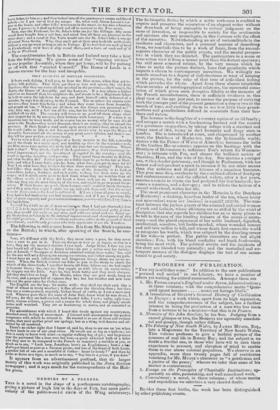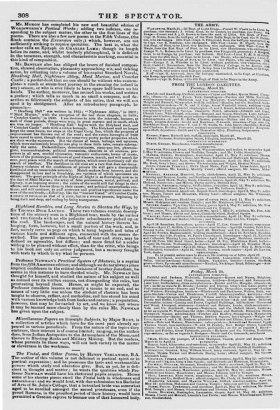Besides these first births, the week has been distinguished by
other publishing events. Mr. Moxow has completed his new and beautiful edition of WORDSWORTH'S Poetical Works ; adding two indexes, one re- sponding to the subject matter, the other to the first lines of the poems. There are also a few new poems in the Fifth Volume, (the Sixth contains the Excursion only* which, however, are not sufficiently striking to require quotation. The best is, what the author calls an Epitaph on .CHARLES LAMB; though its length belies its name, and, whilst tenderly philosophical, it is deficient in the terseness, strength, and characteristic marking, essential in this kind of composition.
Mr. BENTLEY also has obliged the lovers of finished composi- tion, shrewd observation, pleasantry approaching wit, and tickling satire, by collecting into a volume of his capital Standard Novels, Headlong Hall, Nightmare Abbey, Maid Marian, and Crotchet Castle ; a pocket-book that no one should be without who contem- plates a coach or steam-boat journey in the ensuing (or indeed in any) season, or who is ever likely to have spare half-hours on his hands. The author, moreover, has revised his works, and written a preface ; which tells so much in so small a compass, and de- scribes so felicitously the subjects of his satire, that we will not spoil it by abridgment. After an introductory paragraph, he proceeds- " Headlong Hall" was written in 1815; " Nightmare Abbey," in 1817; " Maid Marian," with the exception of the last three chapters, in 1818; " Crotchet Castle," in 1830. I am desirous to note the intervals, because, at each of those periods, things were true, in great matters and in small, which are true no longer. " Headlong Hall" begins with the Holyhead mail, and " Crotchet Castle" ends with a rotten borough. The Holyhead mail no longer keeps the same hours, nor stops at the Capel Cerig Inn, which the progress of improvement has thrown out of the road ; aud the rotten boroughs of 1830 have ceased to exist, though there are some very pretty pocket properties which are their worthy successors. But the classes of tastes, feelings, and opinions, which were successively brought into play in these little tales, remain substan- tially the same. Perfectibilians, deteriorationiste, statu-quo.ites, phrenolo- gists, transcendentalists, political economists, theorists in all sciences, pro- jectors in all arts, morbid visionaries, romantic enthusiasts, lovers of music, lovers of the picturesque, and lovers of good dinners, march, and will march for ever, pan i passe with the march of mechanics, which some facetiously call the march or intellect. The fastidious in old wine are a race that does not decay. Literary violators of the confidences of private life still gain a disreputable livelihood and an unenviable notoriety. Match-makers from interest, and the disappointed in love and in friendship, are varieties of which specimens are extant. The great principle of the Right of Might is as flourishing now as in the days of Maid Marian ; the array of false pretensions, moral, political, and literary, is as imposing as ever ; the rulers of the world still feel things in their effects, and never foresee them in their causes ; and political mountebanks con- tioue, and will continue, to puff nostrums and practise legerdemain under the eves cf the multitude,—following, like the "learned friend" of Crotchet Castle, a course as tortuous as that of a river, but in a reverse process, beginning by being dark and deep, and ending by being transparent.



























 Previous page
Previous page